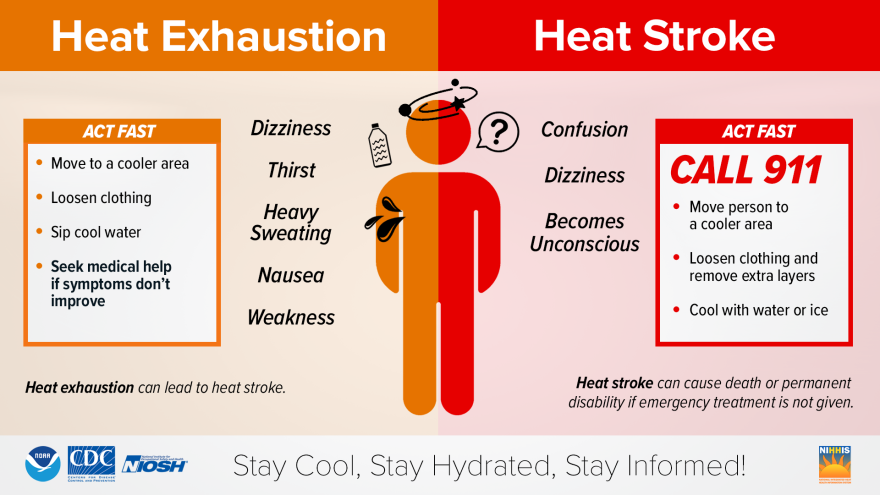A potentially dangerous wave of hot weather arrives in Michigan on Monday, bringing additional risk to outdoor workers and manual laborers.
Highs in the next several days are forecast to be in the 90s, with humidity as high as 60%. Workers in construction, landscaping, agriculture, and food service industries will be at heightened risk for heat-related illness, such as heat exhaustion and heat stroke.
Sherry Scott is a program manager in the Michigan Occupational Safety and Health Administration’s consultation, education and training program. She said safety starts with awareness.
“It starts as simply as making sure that people are aware that there are heat-related illnesses and they are on a spectrum,” she said. Heat-related illnesses range from uncomfortable heat cramps to life-threatening heat stroke.
The agency offers information and consulting for employers who want to keep their workers safe, but don’t know where to start. Over 160 employers reached out to the program last year for assistance, Scott said.
Michigan has no state-level regulations specific to heat. Only California, Oregon, Washington, Minnesota, and the U.S. military have their own heat protections. A national rule drafted by the Department of Labor is under review at the White House.
Employers are required to protect workers from extreme heat under the Michigan Occupational Safety and Health Act. Employers must provide a workplace free of hazards that can cause serious injury or death, which includes extreme heat, according to agency guidelines.
Since June 1, 2023, the state has conducted 65 heat-related enforcement inspections at Michigan employers. Some inspections are routine, while others are prompted by complaints, the occupational safety agency said. Employees who feel their working conditions are unsafe can file a complaint with the agency.
If you’re working outdoors or in an indoor space without air conditioning, follow these tips from the state:
Pre-hydrate and rehydrate. Drink plenty of water in the 24 hours before you start your shift or activity. Drink every 15 minutes while working. And continue to drink after your shift ends. Supplement with electrolytes to replace the minerals your body will lose as well.
Take more breaks. Take them in the shade or indoors if you can. If your supervisor does not allow you to take the breaks you need to stay safe in extreme heat, file a complaint with Michigan’s Occupational Health and Safety Administration.
Get acclimated. Gradually adapt your body to working in extreme heat. Michigan OSHA recommends the 20% rule for new or returning workers: Work at full intensity for no more than 20% of your shift. Increase duration by 20% each day.
Learn the warning signs. Heat illness starts with mild symptoms but can quickly escalate. Stop work, cool down and monitor symptoms if you or someone else shows the following symptoms:
- Headache or nausea
- Weakness or dizziness
- Decreased urine output
- Elevated body temperature
- Painful muscle cramps and spasms
Call 911 if you or someone else shows the following symptoms:
- Vomiting
- Confusion
- Fainting
- Body temperature above 103 degrees
- Rapid pulse
- Dry skin
These are symptoms of heat stroke, a serious medical emergency.
* Clarification: An earlier version of this article referred to the Michigan Occupational Safety and Health Administration as an administration. The story has been updated to reflect that it is an agency.
Copyright 2024 Michigan Public

